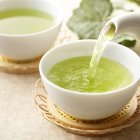Related articles
-
 ग्रीन टी के सेवन से आपको ये 10 आश्चर्यजनक स्वास्थ्य लाभ मिल सकते हैं। 1 दिन में कितना सेवन करें। ग्रीन टी के बारे में महत्वपूर्ण जानकारी।(2020)
ग्रीन टी के सेवन से आपको ये 10 आश्चर्यजनक स्वास्थ्य लाभ मिल सकते हैं। 1 दिन में कितना सेवन करें। ग्रीन टी के बारे में महत्वपूर्ण जानकारी।(2020)
-
 अपनी सेहत अच्छी करने या उसे बरकरार रखने के लिए पिए यह 10 बेहतरीन ऑर्गेनिक ग्रीन टी और देखें इन का कमाल । साथ में कुछ जानकारी और टिप्स ।(2020)
अपनी सेहत अच्छी करने या उसे बरकरार रखने के लिए पिए यह 10 बेहतरीन ऑर्गेनिक ग्रीन टी और देखें इन का कमाल । साथ में कुछ जानकारी और टिप्स ।(2020)
-
 The Secret to a Healthy Life: Green Tea(2020)! Benefits, Facts, Side Effects, and More! And Our Best Recipe for the Best Green Tea Ever!
The Secret to a Healthy Life: Green Tea(2020)! Benefits, Facts, Side Effects, and More! And Our Best Recipe for the Best Green Tea Ever!
What is Green Tea and What is the Best Way to Make Green Tea
Green tea is prepared from the leaves and buds of the same plant from which black tea is made i.e. Camellia sinensis. While the leaves undergo oxidation process for the preparation of black tea, green tea is a bit more in its raw form, hence has more natural ingredients intact. The origin of green tea is in China and from there it spread to India and other Asian countries like Japan and Korea. Green tea is used in making many traditional medicines and there are different varieties of green tea available. Though research studies are still going on for the probable health benefits of green tea on humans, but results till now have shown several positive health benefits.
Preparation of Green Tea: The Right Way to Make a Cup of Green Tea
If you have ever sipped a cup of green tea and haven’t liked the taste then there is a possibility that the leaves were not brewed properly as these delicate leaves need to be brewed correctly to get the fine aroma out of them. There are many flavors of green tea to pick from which include Tulsi, Chamomile, Peppermint, Honey and Jasmine, etc. To prepare the perfect cup of green tea follow the process given below:
Recipe for a Perfect Cup of Green Tea:
- Heat a cup of water in a pan till it’s close to boiling point.
- Now measure 1 tsp green leaves (1 teabag in case you are using green tea bags) and put it in the pan, close the lid for 2 minutes and let the leaves steep in the hot water.
- Strain (through strainer which is used for straining your regular tea) into your cup after 2 minutes and sip to check if it’s strong enough, else steep the leaves for 30 more seconds.
How Much Green Tea in a Day?
Different studies suggest that an individual can benefit from drinking 1-6 cups of green tea in a day depending upon the benefit he/she wants to derive from it. If you want to start taking green tea for weight loss then consuming 2-3 cups a day can help you lose 75-100 calories a day, for diabetes 5-6 cups is recommended, 3-4 cups a day for breast and oral cancer and 1-3 cups everyday reduces the risk of a stroke and other heart related diseases.
Also, some studies suggest that regular consumption of 5-6 cups of green tea everyday can reduce the chances of stomach cancer in women and an equal amount of everyday consumption can prevent men from being diagnosed with prostate cancer as compared to those who don’t drink green tea on a regular basis. Hence, depending upon the specific health condition you are targeting, you can include the number of green tea cups in your routine.
Different Types of Green Tea
The most common form of tea grown in the world, ‘green tea’ gets its name from the green tint of the brew which is obtained from the natural green colour leaves. Though Camellia sinensis remains the source plant for all types of green tea, it’s the harvesting and processing part which defines the type of tea produced from this plant. The first harvest comes around early to mid spring and produces the highest quality leaves, which are the most expensive as well. Some varieties also depend on the drying process, the grinding and rolling technique and also the amount of sunlight received by the plants. The newly picked tea leaves are picked by the farmers, then steamed and roasted to prevent the oxidation process. But stopping the oxidation process is just the first step in the making of green tea before it reaches your cup.
Few famous varieties of Japanese green tea are – Sencha, which is grown in direct sunlight and is from the first or second harvest, quite useful to boost immunity and fight common cold; Gyokuro green tea whose harvesting process is similar to that of Sencha, but these leaves are hidden from the sunlight for about 3 weeks before the harvest. Less exposure to sunlight gives a sweet flavor to this green tea which is beneficial for the brain and nervous system and high levels of theanine also help in tissue growth and healthy skin. Another popular Japanese tea is Matcha, which is the powdered version of Tencha tea (doesn’t undergo the rolling process, hence has larger leaves) and has high level of natural nutrients which rejuvenate healthy skin and detoxify the body.
Some popular Indian variants are turmeric cinnamon green tea, turmeric cardamom green tea, honey lemon green tea, Kashmiri Kahwa green tea, Darjeeling green tea and Ayurvedic green tea.
Green Tea Usage: The Many Benefits of its Regular Consumption
As stated above, green tea has multiple health benefits associated with it and regular consumption can keep many diseases at bay. Now let’s check a few details about the benefits of green tea for various diseases and health conditions.
Prevents Cancer
A study by the National Cancer Institute, USA has shown that polyphenols present in tea decreased tumour growth in animals and also protect against the harmful effects of ultraviolet (UVB) radiation. The countries with higher rate of green tea consumption have shown lower cancer cases as compared to countries where less green tea is consumed. Researchers believe that high levels of polyphenols in tea are beneficial to kill cancer cells, thus stopping their growth. A few studies have shown positive results of green tea on a wide range of cancers which include bladder, breast, ovarian, esophageal (throat), colorectal (bowel), skin, prostate, lung and stomach. For breast cancer, the risk was found to be 20-30% lesser in women who regularly drank green tea as compared to those who didn’t. Similarly for colorectal cancer, the green tea drinkers were at 42% less risk than the non-drinkers.
Beneficial for Heart Health
More than half of the deaths worldwide are due to a stroke, heart and cardiovascular diseases and the main reason behind heart problems is cholesterol and bad cholesterol (LDL). Studied indicate that green tea can improve cholesterol levels by increasing the antioxidant content in the blood, thus protecting the LDL particles from further oxidation which can later become one of the reasons behind heart related problems. People who regularly consume green tea have 31% lesser risk of dying from heart related diseases. Further, a study conducted over 40,000 participants in Japan between the age group 40 to 79, for eleven consecutive years has concluded that those who drank 5 or more cups of green tea had a considerably lower risk of dying as compared to the participants who consumed less than one cup per day.
Lowers Cholesterol
A study conducted by the National Centre for Biotechnology Information showed that regular intake of green tea is helpful in reducing LDL cholesterol concentrations. Researchers believe that an antioxidant catechin found in tea is responsible for lowering the cholesterol levels. As green tea is not fermented, it has a higher catechin percentage and a lower proportion of caffeine as compared to black tea which is a fermented one. This is the reason that black tea can keep you awake at night, but green tea doesn’t have such a side effect.
Healthy Bioactive Compounds
Apart from being a regular drink, green tea has many bioactive compounds which help you protect from various diseases. We have talked about polyphenols, these natural compounds are useful in fighting cancer and reducing inflammation. Then a type of catechin (natural antioxidant) epigallocatechin-3-gallate (EGCG) is also present which prevents cell and molecule damage by forming free radicals in the body and has other health benefits as well. Green tea also has minerals which are useful for your body, but always choose a good quality of tea as cheap quality green tea may have higher amounts of fluoride which is not good for the health.
Protects Brain from Ageing
Research suggests that regular intake of green tea can work wonders for the cognitive functions, especially the working memory. The findings also mention that green tea is useful in the treatment of cognitive impairments related to neuropsychiatric disorders, like dementia. In another study in 2011, a component of green tea called CAGTE (Colon Available Green Tea Extract) was studied and based on this study the Alzheimer’s Society mentioned that green tea has elements which may be helpful in lowering the risk of Alzheimer’s disease and other mental conditions like stress and chronic fatigue. Also, one of the key ingredients, caffeine helps stimulate neurotransmitters like dopamine which affects your mood.
Type 2 Diabetes
Type 2 diabetes has become a lifestyle disease and a large portion of the population is affected by this genetic disease. Diabetes is directly associated with the inability of the body to produce insulin which results in high blood sugar levels, as insulin is the hormone which uses the extra sugar produced in the body. A study in Japan concluded that those who were regularly consuming green tea were at 42% lower risk of diabetes (type 2) as compared to those who were either not drinking at all or consuming it in moderate amounts. Another conclusion from 7 combined studies comprising of 286,701 people showed that regular green tea drinkers had 18% lower risk of type 2 diabetes.
Useful in Inflammatory Skin Diseases
In the year 2007, a study concluded that green tea may be a promising new treatment for skin disorders like dandruff and psoriasis. The studies conducted on animals for inflammatory skin diseases further categorised into patches of red, dry and flaky skin as a result of inflammation and excess production of skin cells showed sluggish growth of skin cells and also the presence of a gene responsible for the regulation of cells' life cycles.
Burns Fat
Many of you would have heard that green tea is effective in reducing fat and losing weight. The theory lies in the result of researches which claim that green tea is an effective metabolism booster, thus increasing the fat burning process. In a study conducted on 10 healthy men, regular intake of green tea showed a 4% increase in the number of calories burnt. In another study which involved 12 healthy men, the oxidation process was increased by 17% with dosage of green tea extract as compared to a placebo. Moreover, the caffeine present in green tea also improves the physical performance thus boosting the fat burning process.
Reduces Bad Breath
We have already mentioned about various benefits of catechins, but these antioxidants are also beneficial for oral health by suppressing the growth of bacteria and lowering the risk of infections significantly. Bacteria like Streptococcus mutans are responsible for plaque formation resulting in problems like tooth decay and cavities and catechins can effectively kill these harmful bacteria.
Reduces Risk of Stroke
A research published in Stroke: Journal of the American Heart Association has concluded that a small lifestyle change like including a few cups of green tea in your daily routine can significantly reduce the risk of a heart stroke. Some studies have also shown the positive impact of green tea in conditions like cervical dysplasia, oral leukoplakia, clogged arteries (coronary artery disease), low blood pressure and Parkinson’s disease.
Side Effects of Green Tea
Consuming large amounts of green tea on a regular basis can have implications on the body as it contains caffeine. Some side effects are headache, irregular heartbeat, irritability, dizziness, confusion, nervousness, heartburn, etc. High levels of caffeine reduce the amount of calcium in your bones, thus increasing the risk of osteoporosis (a disease in which bones become weak and are prone to breaking by even a small jerk or injury).
Children can take green tea in moderate amounts or for gargling up to 3 times a day, pregnant and breastfeeding women can take up to 2 cups per day. People suffering from anaemia, anxiety disorder, bleeding disorders, heart conditions, diarrhoea, glaucoma, high BP, irritable bowel syndrome and liver disease should either avoid green tea or take it in lesser amount and track the effects first. Other factors like your lifestyle, age factor and health condition also determine the quantity of green tea you can consume on a daily basis, but it is recommended to not consume more than 5-6 cups per day.
Related articles
-
 Gained Extra Weight in the Lockdown? Best Slimming Tea to Get in the Right Shape and Live a Healthier Life
Gained Extra Weight in the Lockdown? Best Slimming Tea to Get in the Right Shape and Live a Healthier Life
-
 ग्रीन टी के सेवन से आपको ये 10 आश्चर्यजनक स्वास्थ्य लाभ मिल सकते हैं। 1 दिन में कितना सेवन करें। ग्रीन टी के बारे में महत्वपूर्ण जानकारी।(2020)
ग्रीन टी के सेवन से आपको ये 10 आश्चर्यजनक स्वास्थ्य लाभ मिल सकते हैं। 1 दिन में कितना सेवन करें। ग्रीन टी के बारे में महत्वपूर्ण जानकारी।(2020)
-
 Replace Your Regular Morning Cuppa with Organic Green Tea: 10 of the Finest Green Teas Available in India + How to Make the Ideal Brew (2019)
Replace Your Regular Morning Cuppa with Organic Green Tea: 10 of the Finest Green Teas Available in India + How to Make the Ideal Brew (2019)
-
 The Secret to a Healthy Life: Green Tea(2020)! Benefits, Facts, Side Effects, and More! And Our Best Recipe for the Best Green Tea Ever!
The Secret to a Healthy Life: Green Tea(2020)! Benefits, Facts, Side Effects, and More! And Our Best Recipe for the Best Green Tea Ever!
-
 Looking for Best Herbal Tea List of 2020? Check Out these Recipes and Boost your Immune System to Stay Healthy.
Looking for Best Herbal Tea List of 2020? Check Out these Recipes and Boost your Immune System to Stay Healthy.
Green Tea Usage – Regularity and Moderation is the Key
As you would have discovered by now, if you truly want to get the numerous health benefits of green tea then you need to use it regularly but in moderation. We hope you will start drinking green tea immediately and encourage others to do so as well. Stay connected with us for more such engaging content.